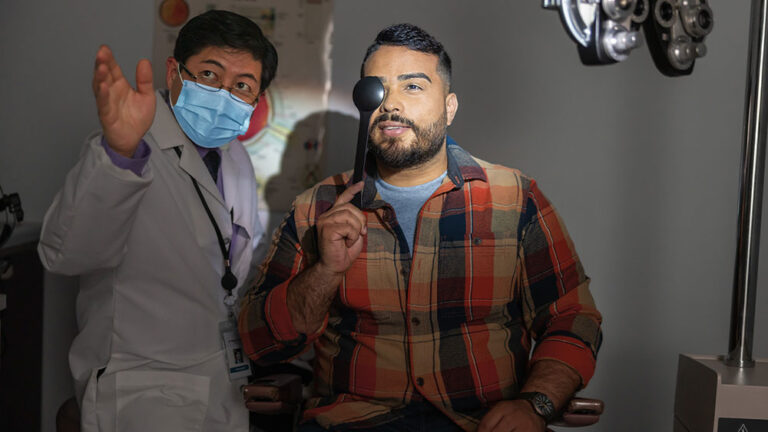Routine vision care exams are an essential part of maintaining good vision. You and your eye doctor will cover a lot during this limited time, so it’s important to get the most out of it. These five tips will help you have a more productive visit, ensuring you cover the important information so that you can feel confident about your vision health.
1. Think about the goals of your visit
Planning ahead ensures you make the most of your time with your eye doctor. Consider what you’re looking to get from your time together. Is this a routine vision care exam? Is there something you’re concerned about, like blurry vision or eye pain? This can help you prioritize your concerns.
2. Share your medical and vision history
If it’s your first visit with an eye doctor, be sure to introduce yourself and share your records, which you can request from your primary care doctor and previous eye doctor.
Many different aspects of your overall health are associated with vision health. When your eye doctor has an informed picture of your medical and vision history, they can provide you with the right care.
Your eye doctor will especially want to know about any pre-existing medical conditions, past surgeries and medications that you’re taking that may affect your vision health. This includes chronic conditions like diabetes or high blood pressure, which are associated with vision problems.
3. Be thorough when talking about your vision
What you’ve experienced can be just as useful as any test results. Be sure to mention any changes in your vision to your eye doctor, including but not limited to:
- Blurriness
- Double vision
- Floaters
- Flashes of light
- An itching or burning sensation
- Dryness
Explain when you first noticed the problem, when it seems to occur, when was the last time it happened and when it has changed. Describe what makes the problem better or worse. All of this information helps your eye doctor determine what screenings they need to perform or if they need to refer you to a specialist.
4. Ask questions
Don’t be afraid to ask your eye doctor any questions you may have about your vision health or treatment options. Your doctor is there to support you. You can write down your questions and/or your eye doctor’s answers if that helps you remember.
The best treatment for vision conditions is to prevent them from happening in the first place. That’s why it’s a good idea to also ask your eye doctor about healthy habits that help you maintain good vision. This may include lifestyle changes, such as eating a healthy diet, getting more physical activity and wearing protective eyewear.
5. Don’t forget to schedule your next appointment
Schedule your next appointment before you leave. If your doctor recommends a follow-up appointment, this helps you stick to the recommended treatment plan. If you don’t need additional care, having another routine comprehensive vision care exam scheduled will help to ensure you maintain good vision health and catch any potential vision-related issues early on.
The bottom line
It’s important to make sure you and your eye doctor both have the necessary information so you can maintain good vision health. These visits should make you feel informed and empowered by the time you leave.
Remember, if you have any questions or general inquiries about your vision coverage, visit our contact page. You can also use our Provider Finder tool to search our nationwide network of independent providers and national retailers to find one near you.

